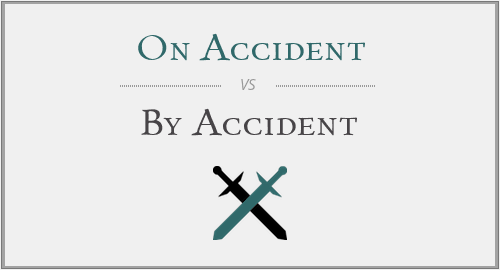By accident...
The correct phrase (adverb) to use traditionally, is: ‘by accident’. It means by mistake or something that’s done without the intention of doing it. For example, “she spilled the milk by accident.” We can also use the word ‘accidentally’ as a replacement for by accident – just two ways of referring to the same thing. Some other synonyms of the phrase include unintentionally or by chance.
More examples:
Do you think it is by accident that she got a double promotion?
I opened my mailbox by accident while checking something else and was surprised to see your mail.
Sometimes, what we do or say, even by accident, just backfires; so always be careful.
If I ever hurt your feelings, it was by accident; please let me know so I can apologize.
The glass slipped from my hand by accident.
On accident…
A far less commonly used variant of by accident - on accident, is almost exclusively used in the United States - and incorrectly so. Even there, no one uses ‘on accident’ in writing; it's only a spoken English term. In fact, it is considered incorrect to be used at all.
Now, some people tend to use on accident as they rationalize that it must follow a similar structure to ‘on purpose’ although the meaning is completely the opposite. Yet another cause of confusion is interestingly the word 'accident' itself!

The word accident can be an adjective as in the case:
We had an accidental meeting.
And it can also be a common noun as in:
The head-on accident led to several injuries and two deaths.
or
There was no news report on the accident that happened yesterday.
Perhaps the preposition 'on' preceding the word accident is what causes people to use the phrase on accident instead of by accident.
If it is said – “The glass slipped from my hand on accident”, it just doesn’t seem or sound right.
As explained above, on accident is not commonly used as an adverb phrase, if at all. Whereas, ‘by accident’ is the only correct phrase to use when indicating an unintentional or accidentally carried-out action.




Have a discussion about this article with the community:
Report Comment
We're doing our best to make sure our content is useful, accurate and safe.
If by any chance you spot an inappropriate comment while navigating through our website please use this form to let us know, and we'll take care of it shortly.
Attachment
You need to be logged in to favorite.
Log In